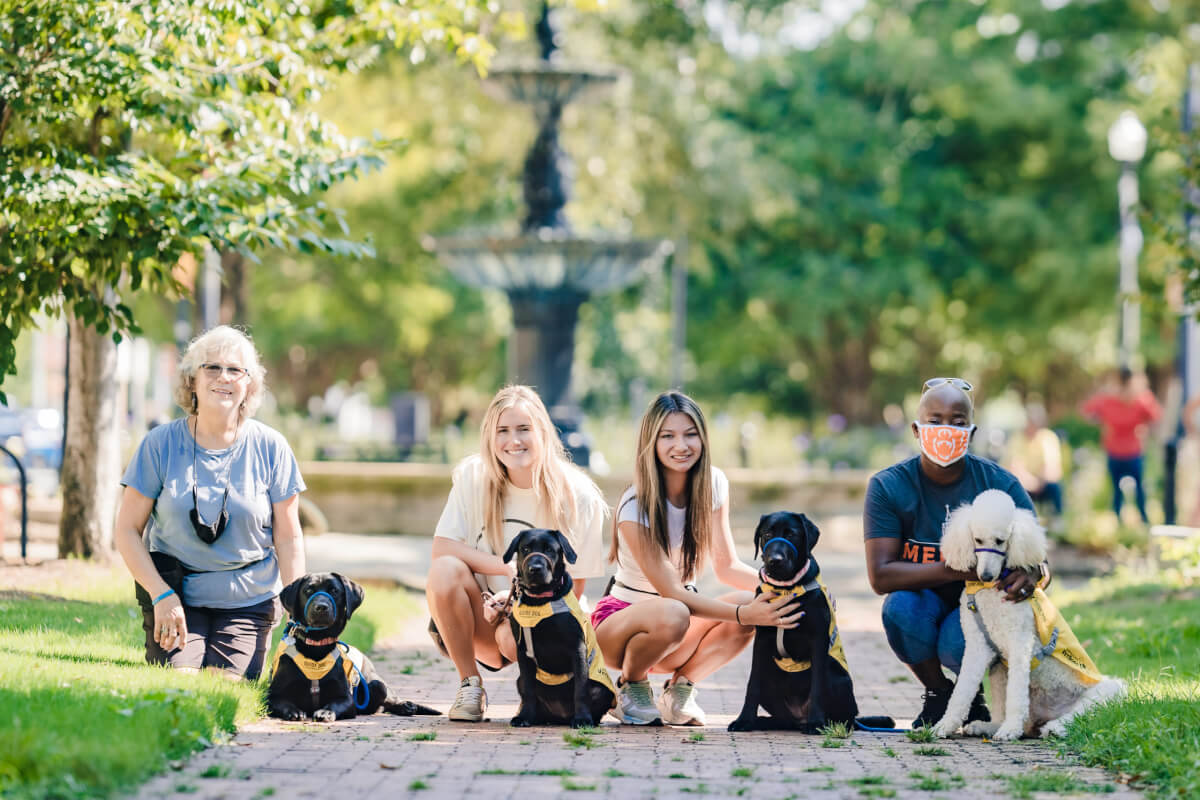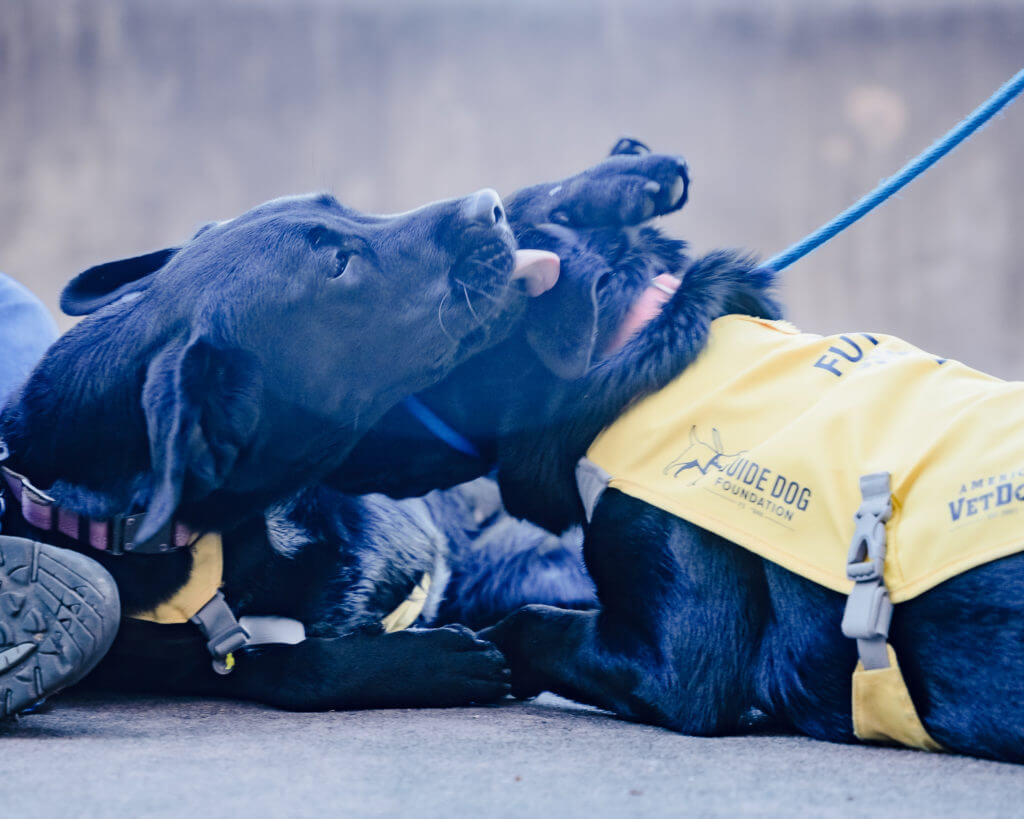
Pawsitive programming
By Jane Winston
Photography by Mike Young
This is the second in a series of articles about the Vision Guide Dog Program. Read the first article at maconmagazine.com.
The Burruss Correctional Training Center (BCTC) in Forsyth is home to the Vision Guide Dog Program, which allows BCTC inmates to begin the rudimentary training of Labradors, Golden Retrievers, Standard Poodles and first-generation Goldador mixes. These dogs will hopefully become guide dogs for the blind and visually impaired.
The Guide Dog Association of America breeds the dogs in Smithtown, New York, and transports them, at about 8 weeks old, to BCTC, which is the only prison that raises guide dog puppies for the organization. There are several prisons in the northern U.S. that raise pups for America’s Vet Dogs, a sister organization to the Guide Dog Association.
Inmates in the program work with the dogs on basic training commands, as well as grooming and socialization. While the dogs learn skills, the inmates are able to earn a veterinary-helper certificate from Central Georgia Technical College.
On weekends, the young pups stay with families and individuals across Central Georgia who take them into their homes and continue the socialization training.
In their vests and on leashes, they visit the grocery store, movie theater, hair and nail salon, shoe store, school events, athletic events, parks, public transportation, classrooms, doctor’s offices, restaurants, etc. By law, businesses must allow the trainer and the dog inside the establishment.
Shannon McCormick and her family, from Macon, have volunteered as weekend trainers for years.
“When we picked up our dog, we were given the right amount of food, feeding instructions, other needed items and detailed instructions on what to do over the weekend,” McCormick said. “The dog’s age dictated where it was in the training process and just what the weekend assignment was. Our family of mom, dad and three sons always likened it to a homework assignment. The ‘doggy kids’ were sent home to practice what they learned during their week. Often, we were asked to work on some specific skill with which the dog was struggling.”
Even though the weekend assignments might be extensive, McCormick said her whole family understands the vital work of properly training the dogs.
“We knew this sweet pup, entrusted to our family, was scheduled to graduate and go on to be responsible for escorting an individual with no sight. It is a huge responsibility, which our family relished, as we felt that as a family unit we were truly giving back,” she said.
On a recent weekend, Macon area group leader Camille Whiston conducted her transportation training for the weekend.
“None of these pups are a year old yet. The assignment for this weekend was to familiarize them with public transportation. We boarded a small Macon Transit bus and went to Central City Park. There, we all got off, did a few drills in the park, boarded the bus and returned to the bus terminal,” Whiston said. “The trainers then worked with the dogs on getting on and off larger buses and managing the aisles.”
Whiston is a University of Georgia graduate who did weekend training while on campus and now oversees all of the weekend trainers in the Macon area.
“I worked with two dogs throughout my freshman and junior years. I also worked closely with the southeast coordinator, Deane Izzo, located in Athens. UGA and Athens have more of the weekend trainers than any other area,” she said.
For many reasons, dogs can’t always complete the program to become guide dogs. So, they often are cross-trained for other careers such as bomb-sniffing dogs, Post Traumatic Syndrome dogs, police dogs or some other type of service dog. Some are adopted out, and some actually return to Smithtown where they become a part of their breeding program.
“My own dog, Bogie, is a dog ‘released’ from the Vision Project. So, Bogey now calls my home his home,” Whiston said.
Tenley Pelissier is a senior at First Presbyterian day School (FPD) and one of three FPD students who are some of the younger trainers in the program. Her pup, Dolly, is a black Labrador. Among the tasks Tenley helped Dolly with was how to walk over grates, deal with garbage trucks and other loud noises, other animals, air-borne objects and navigate stairs. They also practice specific “nature break” commands. Dogs are trained to go “little busy” and “big busy” on the cement only — never in the grass or pine straw.
“FPD encourages bringing the guide dogs to events. So, Dolly and I are really excited, as she will be my escort for senior night next year,” Pelisser said. “My family and I love having a guide dog pup in our home, and we will have one as long as there is a need.”
Abigail Deese, a UGA graduate with a master’s degree in Occupational Therapy from Augusta University, trained guide dogs while on campus.
“I am now an occupational therapist in Macon. I’m new to the Macon area program, so I don’t have my own dog yet, but when weekend ‘camping’ (subbing) is needed, I am happy to help in that role,” Deese said. “My black Labrador, Denny, was at Burrus in training when he showed signs of fear when smelling raw/uncooked fish at the grocery store. He was never able to overcome that fear, so was released for adoption. Denny now calls my home his home!”
As the weekend comes to an end, the families pack up their pups and their belongings. They then practice getting in the car and ride back to BCTC. There they practice getting out of the car, going up stairs to meet their inmate trainers and preparing for yet another week of learning the basics of obedience and discipline in hopes of one day becoming a guide dog.
Interested in being a weekend trainer? Reach out to Lundianne Johnson at lundianejohnson@yahoo.com.
Coming next: We’ll take a look at what happens with the dogs after they complete the Vision Guide Dog Program, as well as the impact they have on the lives of others.








